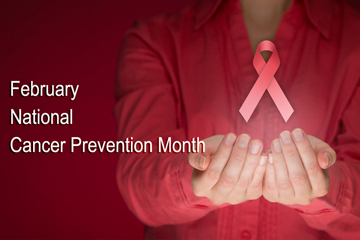February is observed as “National Cancer Prevention Month” in the United States. This month-long campaign aims to increase public awareness about the prevention of cancer. Cancer is a heterogeneous group of diseases that results from abnormal cell growth. The growth often invades surrounding tissue and spreads to other parts of the body. This dangerous disease is the second-leading cause of death in the world. The American Cancer Society (ACS) estimated that more than 1.8 million new cancer cases are expected to be diagnosed in 2020 and about 606,520 Americans are expected to die of cancer in 2020 which translates to about 1,660 deaths per day.

The American Association for Cancer Research (AACR), the first and largest cancer research organization in the world, is committed to advancing the science of cancer prevention. The AACR Cancer Prevention, Early Detection, and Interception Committee helps together to develop initiatives to promote global cancer prevention, increase national awareness, and educate the lay public about cancer prevention. The AACR works with a wide range of partners in biomedical research to develop strategies and promising approaches to prevention, aiming to stop cancer before it starts.
Can cancer be prevented? According to the ACS, a substantial proportion of cancers caused by tobacco use and other unhealthy behaviors can be prevented. A recent study by ACS researchers shows that:
- At least 42% of newly diagnosed cancers in the US – about 750,000 cases in 2020 – are potentially avoidable. This includes 19% of all cancers that are caused by smoking and 18% of cancers caused by a combination of excess body weight, alcohol consumption, poor nutrition, and physical inactivity.
- Certain cancers caused by infectious agents, such as human papillomavirus (HPV), hepatitis B virus (HBV), hepatitis C virus (HCV), and Helicobacter pylori (H. pylori), could be prevented through behavioral changes or vaccination to avoid the infection, or treatment of the infection.
- Many of the more than 5 million skin cancer cases that are diagnosed annually could be prevented by protecting the skin from excessive sun exposure and not using indoor tanning devices.
While changing unhealthy lifestyle habits may help prevent cancer, early screening, can reduce the risk of spread of certain cancers by detecting precancerous lesions that can be removed. Cancer that is diagnosed at an early stage is more likely to be successfully treated.
Here are some tips to prevent cancer:
- Quit smoking and tobacco use: Cigarette smoking causes lung cancer and tobacco products such as cigars, cigarillos, waterpipes, and smokeless tobacco, have also been causally linked to cancer. Despite decades of declines in cigarette smoking prevalence, about 30% of all cancer deaths, and as much as 40% of those among men in some Southern states, are still caused by smoking cigarettes. This is partly because smoking rates remain high in many segments of the population. Tobacco use remains the leading preventable cause of death in the US (cancer.org/). So quit smoking and tobacco use to reduce your risk of developing cancer.
- Maintain a healthy weight: An estimated 5% of cancers in men and 11% in women can be attributed to excess body weight. Being overweight or obese is associated with an increased risk of developing several types of cancer. So be mindful of your weight. Work to achieve and maintain a healthy weight through a combination of a healthy diet and regular exercise. Exercise plays an important role in maintaining a healthy weight and preventing obesity. Aim for at least 30 minutes of exercise every day. Choose a diet that includes lots of fruits, vegetables, whole grains and lean proteins. Avoid sugary items, red meat and fried food as these are tied to increased cancer risk.
- Limit alcohol consumption: If you do drink alcohol, do it in moderation. Limit yourself to one drink a day if you’re a woman of any age or a man older than age 65, or two drinks a day if you’re a man 65 years old or younger. If you have more than two drinks a day for years, it will increase your chances of developing various types of cancer.
- Avoid excessive sun exposure: Overexposure to sunlight is harmful. The ultraviolet (UV) rays from the sun can increase your risk of skin cancer, the most common form of cancer in the United States. To minimize your risks, avoid direct exposure to sunlight between 10 am and 3 pm, wear protective clothing, use sunscreen before stepping out, and have regular skin exams.
- Schedule cancer screening exams: Educate yourself about cancer screenings and talk to your doctor about what types of cancer screening exams are best for you based on your risk factors.
- Get vaccinated: Immunizations may help prevent certain viruses that increase risk of cancer, such as hepatitis B, which increases the risk of liver cancer, and human papillomavirus (HPV), which increases the risk of cervical cancer and other cancers. Ask your doctor whether immunization against these viruses is appropriate for you (www.mayoclinic.org).
February 4 is observed as World Cancer Day to raise awareness about cancer and to encourage people to work to make it a global health priority. The Union for International Cancer Control (UICC) has launched a new 3-year (2019-2021) campaign with the theme: “I Am and I Will.” The message is: “Whoever you are, you have the power to reduce the impact of cancer for yourself, the people you love and for the world. It’s time to make a personal commitment.”